Qur'an and Scientific Discoveries: Comparing Interpretations and Views
VerifiedAdded on 2022/12/14
|10
|3422
|297
Essay
AI Summary
This essay delves into the multifaceted relationship between the Qur'an and scientific discoveries, examining the various approaches scholars and thinkers have adopted in interpreting the holy book in light of modern scientific advancements. The essay begins by providing a historical overview of Qur'anic exegesis, or tafsir, highlighting the evolution of interpretive methods from the early oral traditions to the development of written commentaries. It then explores the different genres of Qur'anic exegesis, including traditional, rational, scientific, literary-based, historical and contextualized, and political commentaries, analyzing their methodologies and underlying assumptions. The essay particularly focuses on the scientific commentary, exploring how some scholars attempt to reconcile the Qur'an with scientific findings, while also addressing the criticisms and challenges associated with this approach. Furthermore, it examines the role of theology and law in the interpretation of the Qur'an, emphasizing how changes in theological perspectives can influence the understanding of the holy book. The essay also discusses the influence of the Qur'an on various Islamic disciplines, such as theology, philosophy, and education, and how these disciplines contribute to its interpretation. Finally, it considers the implications of interpreting the Qur'an in the context of modern challenges and the ongoing debates surrounding the relationship between religion and science.
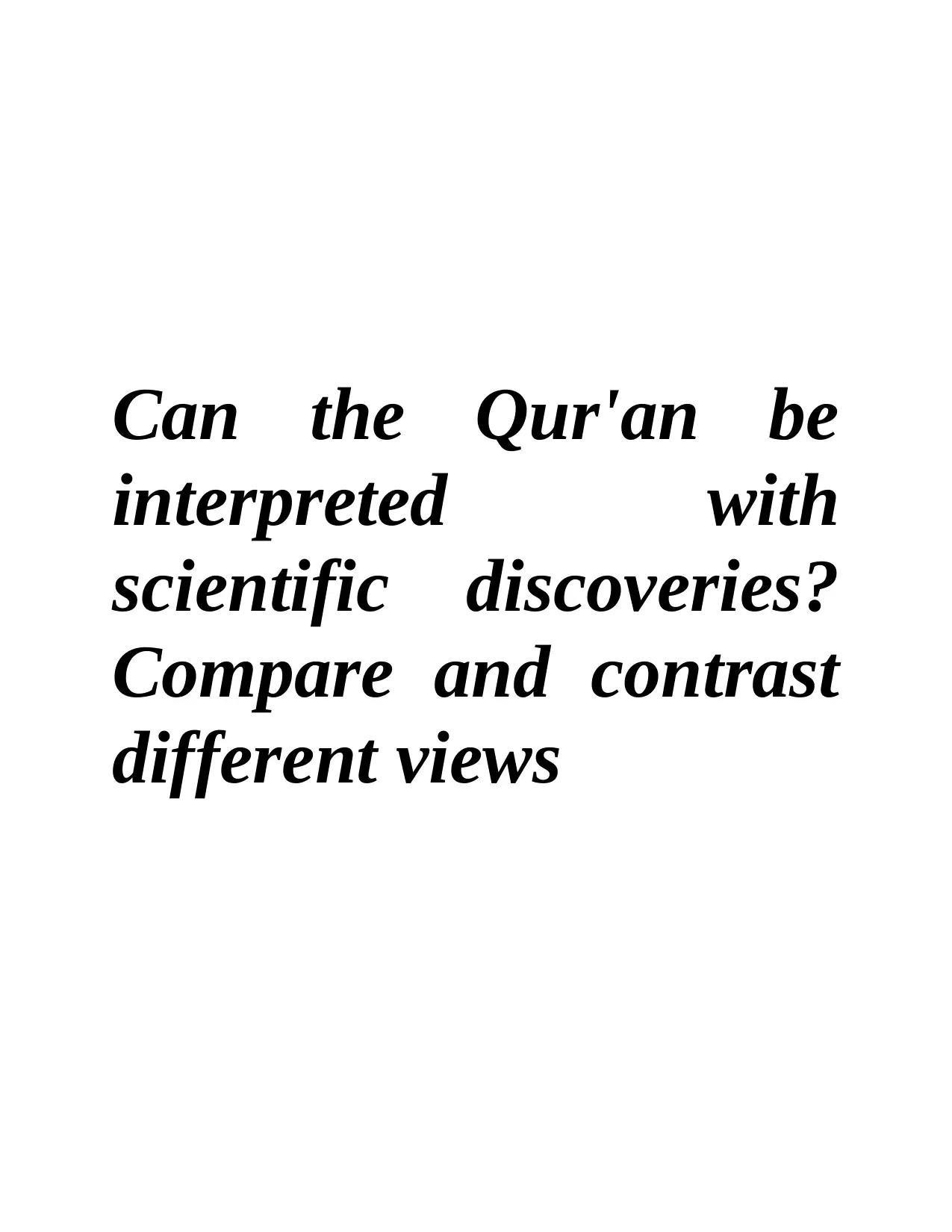
Can the Qur'an be
interpreted with
scientific discoveries?
Compare and contrast
different views
interpreted with
scientific discoveries?
Compare and contrast
different views
Paraphrase This Document
Need a fresh take? Get an instant paraphrase of this document with our AI Paraphraser
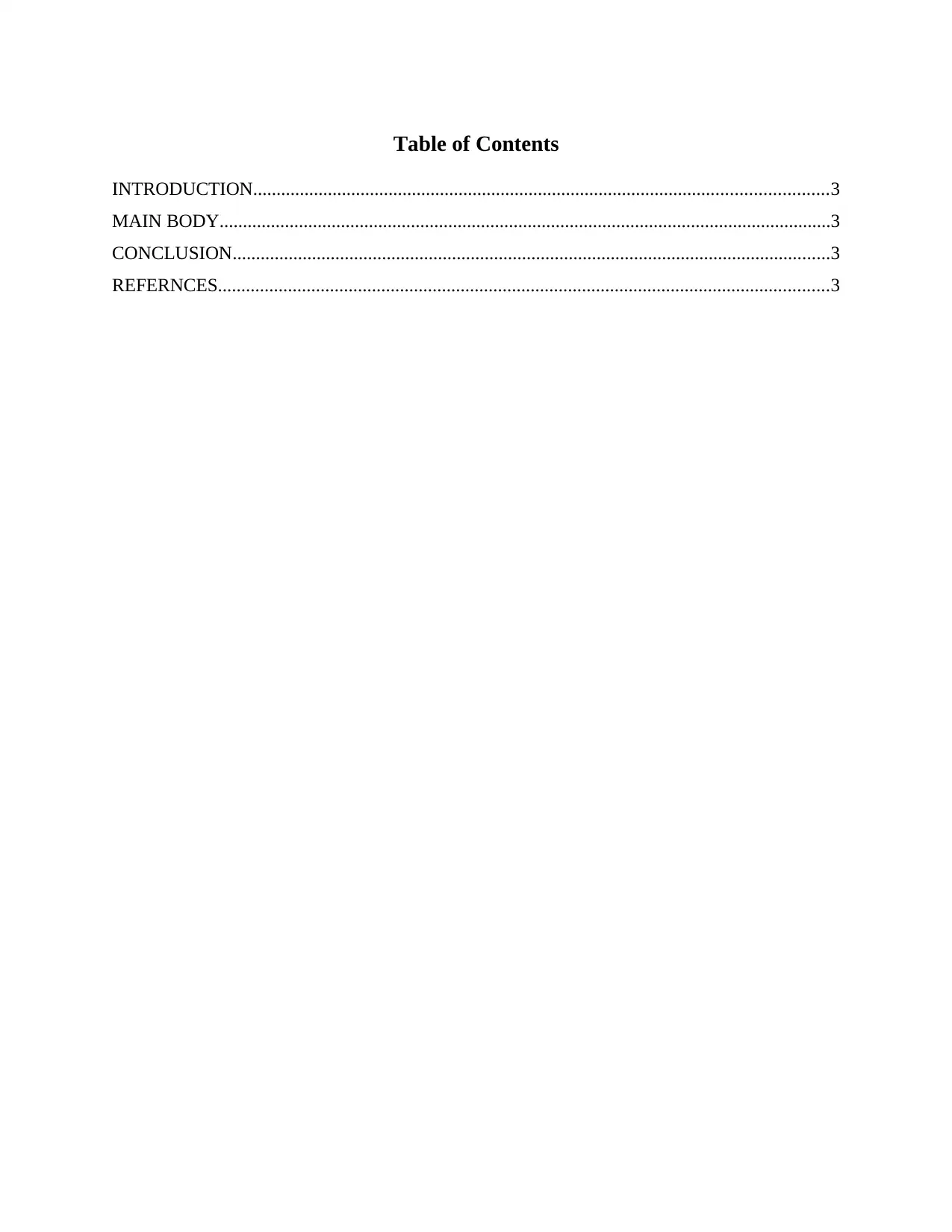
Table of Contents
INTRODUCTION...........................................................................................................................3
MAIN BODY...................................................................................................................................3
CONCLUSION................................................................................................................................3
REFERNCES...................................................................................................................................3
INTRODUCTION...........................................................................................................................3
MAIN BODY...................................................................................................................................3
CONCLUSION................................................................................................................................3
REFERNCES...................................................................................................................................3
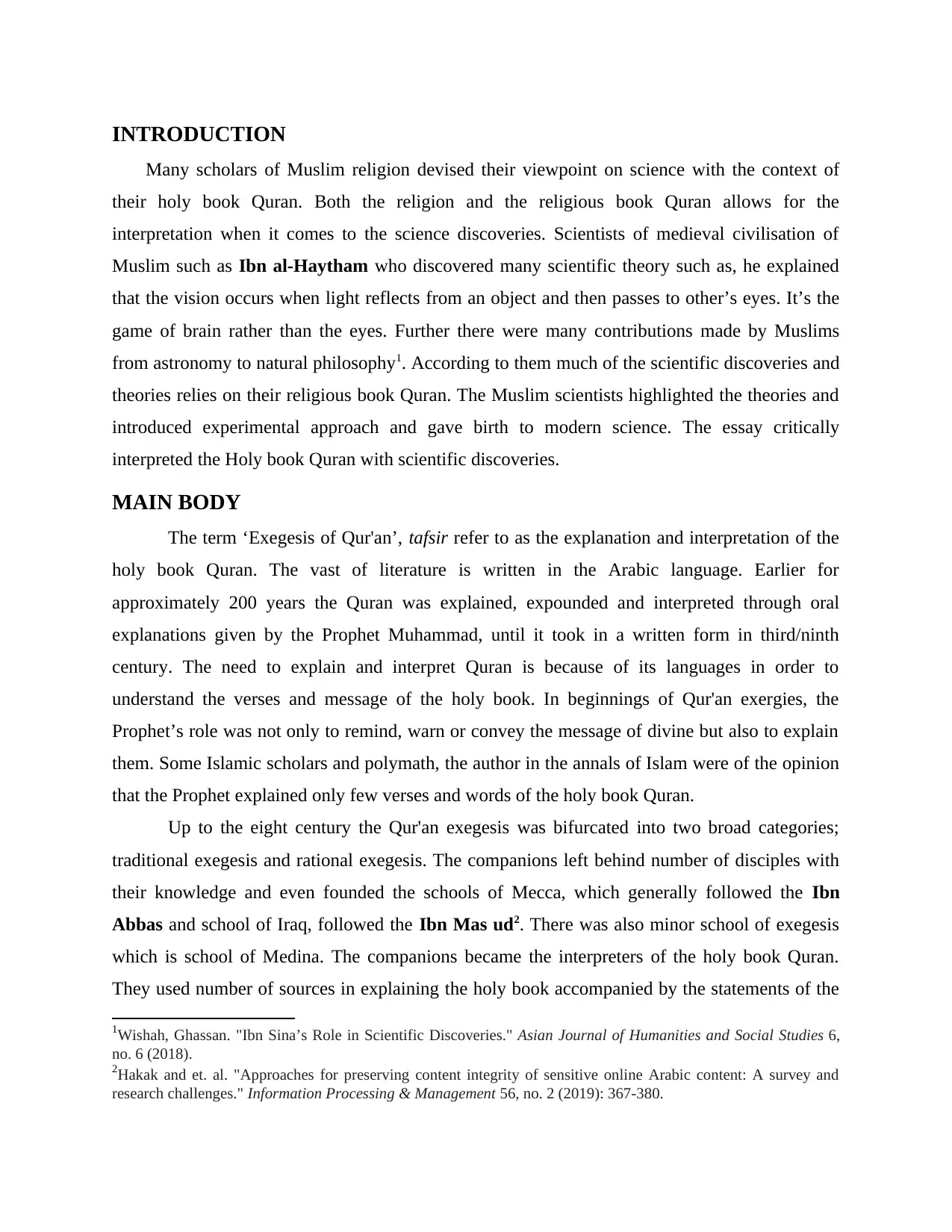
INTRODUCTION
Many scholars of Muslim religion devised their viewpoint on science with the context of
their holy book Quran. Both the religion and the religious book Quran allows for the
interpretation when it comes to the science discoveries. Scientists of medieval civilisation of
Muslim such as Ibn al-Haytham who discovered many scientific theory such as, he explained
that the vision occurs when light reflects from an object and then passes to other’s eyes. It’s the
game of brain rather than the eyes. Further there were many contributions made by Muslims
from astronomy to natural philosophy1. According to them much of the scientific discoveries and
theories relies on their religious book Quran. The Muslim scientists highlighted the theories and
introduced experimental approach and gave birth to modern science. The essay critically
interpreted the Holy book Quran with scientific discoveries.
MAIN BODY
The term ‘Exegesis of Qur'an’, tafsir refer to as the explanation and interpretation of the
holy book Quran. The vast of literature is written in the Arabic language. Earlier for
approximately 200 years the Quran was explained, expounded and interpreted through oral
explanations given by the Prophet Muhammad, until it took in a written form in third/ninth
century. The need to explain and interpret Quran is because of its languages in order to
understand the verses and message of the holy book. In beginnings of Qur'an exergies, the
Prophet’s role was not only to remind, warn or convey the message of divine but also to explain
them. Some Islamic scholars and polymath, the author in the annals of Islam were of the opinion
that the Prophet explained only few verses and words of the holy book Quran.
Up to the eight century the Qur'an exegesis was bifurcated into two broad categories;
traditional exegesis and rational exegesis. The companions left behind number of disciples with
their knowledge and even founded the schools of Mecca, which generally followed the Ibn
Abbas and school of Iraq, followed the Ibn Mas ud2. There was also minor school of exegesis
which is school of Medina. The companions became the interpreters of the holy book Quran.
They used number of sources in explaining the holy book accompanied by the statements of the
1Wishah, Ghassan. "Ibn Sina’s Role in Scientific Discoveries." Asian Journal of Humanities and Social Studies 6,
no. 6 (2018).
2Hakak and et. al. "Approaches for preserving content integrity of sensitive online Arabic content: A survey and
research challenges." Information Processing & Management 56, no. 2 (2019): 367-380.
Many scholars of Muslim religion devised their viewpoint on science with the context of
their holy book Quran. Both the religion and the religious book Quran allows for the
interpretation when it comes to the science discoveries. Scientists of medieval civilisation of
Muslim such as Ibn al-Haytham who discovered many scientific theory such as, he explained
that the vision occurs when light reflects from an object and then passes to other’s eyes. It’s the
game of brain rather than the eyes. Further there were many contributions made by Muslims
from astronomy to natural philosophy1. According to them much of the scientific discoveries and
theories relies on their religious book Quran. The Muslim scientists highlighted the theories and
introduced experimental approach and gave birth to modern science. The essay critically
interpreted the Holy book Quran with scientific discoveries.
MAIN BODY
The term ‘Exegesis of Qur'an’, tafsir refer to as the explanation and interpretation of the
holy book Quran. The vast of literature is written in the Arabic language. Earlier for
approximately 200 years the Quran was explained, expounded and interpreted through oral
explanations given by the Prophet Muhammad, until it took in a written form in third/ninth
century. The need to explain and interpret Quran is because of its languages in order to
understand the verses and message of the holy book. In beginnings of Qur'an exergies, the
Prophet’s role was not only to remind, warn or convey the message of divine but also to explain
them. Some Islamic scholars and polymath, the author in the annals of Islam were of the opinion
that the Prophet explained only few verses and words of the holy book Quran.
Up to the eight century the Qur'an exegesis was bifurcated into two broad categories;
traditional exegesis and rational exegesis. The companions left behind number of disciples with
their knowledge and even founded the schools of Mecca, which generally followed the Ibn
Abbas and school of Iraq, followed the Ibn Mas ud2. There was also minor school of exegesis
which is school of Medina. The companions became the interpreters of the holy book Quran.
They used number of sources in explaining the holy book accompanied by the statements of the
1Wishah, Ghassan. "Ibn Sina’s Role in Scientific Discoveries." Asian Journal of Humanities and Social Studies 6,
no. 6 (2018).
2Hakak and et. al. "Approaches for preserving content integrity of sensitive online Arabic content: A survey and
research challenges." Information Processing & Management 56, no. 2 (2019): 367-380.
⊘ This is a preview!⊘
Do you want full access?
Subscribe today to unlock all pages.

Trusted by 1+ million students worldwide
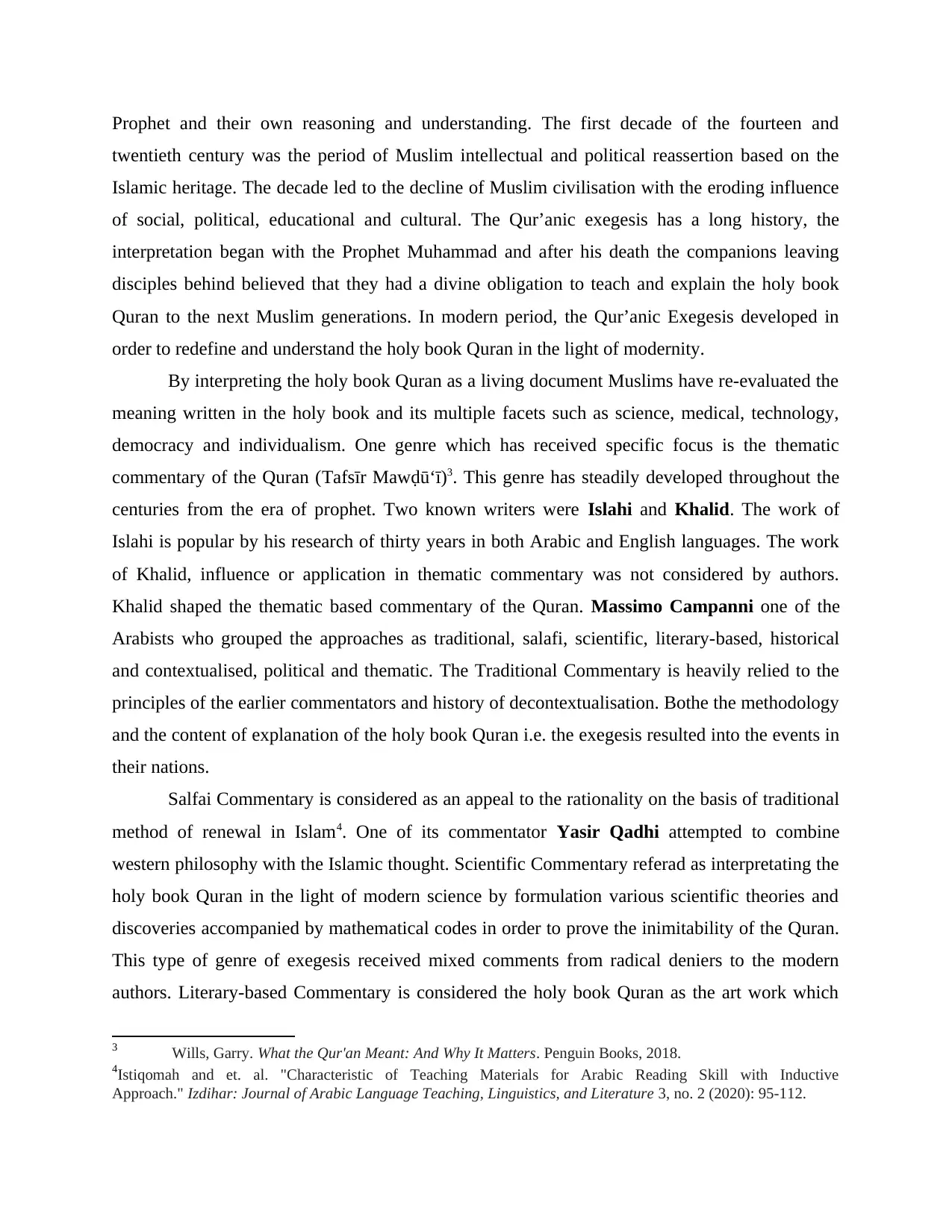
Prophet and their own reasoning and understanding. The first decade of the fourteen and
twentieth century was the period of Muslim intellectual and political reassertion based on the
Islamic heritage. The decade led to the decline of Muslim civilisation with the eroding influence
of social, political, educational and cultural. The Qur’anic exegesis has a long history, the
interpretation began with the Prophet Muhammad and after his death the companions leaving
disciples behind believed that they had a divine obligation to teach and explain the holy book
Quran to the next Muslim generations. In modern period, the Qur’anic Exegesis developed in
order to redefine and understand the holy book Quran in the light of modernity.
By interpreting the holy book Quran as a living document Muslims have re-evaluated the
meaning written in the holy book and its multiple facets such as science, medical, technology,
democracy and individualism. One genre which has received specific focus is the thematic
commentary of the Quran (Tafsīr Mawḍū‘ī)3. This genre has steadily developed throughout the
centuries from the era of prophet. Two known writers were Islahi and Khalid. The work of
Islahi is popular by his research of thirty years in both Arabic and English languages. The work
of Khalid, influence or application in thematic commentary was not considered by authors.
Khalid shaped the thematic based commentary of the Quran. Massimo Campanni one of the
Arabists who grouped the approaches as traditional, salafi, scientific, literary-based, historical
and contextualised, political and thematic. The Traditional Commentary is heavily relied to the
principles of the earlier commentators and history of decontextualisation. Bothe the methodology
and the content of explanation of the holy book Quran i.e. the exegesis resulted into the events in
their nations.
Salfai Commentary is considered as an appeal to the rationality on the basis of traditional
method of renewal in Islam4. One of its commentator Yasir Qadhi attempted to combine
western philosophy with the Islamic thought. Scientific Commentary referad as interpretating the
holy book Quran in the light of modern science by formulation various scientific theories and
discoveries accompanied by mathematical codes in order to prove the inimitability of the Quran.
This type of genre of exegesis received mixed comments from radical deniers to the modern
authors. Literary-based Commentary is considered the holy book Quran as the art work which
3 Wills, Garry. What the Qur'an Meant: And Why It Matters. Penguin Books, 2018.
4Istiqomah and et. al. "Characteristic of Teaching Materials for Arabic Reading Skill with Inductive
Approach." Izdihar: Journal of Arabic Language Teaching, Linguistics, and Literature 3, no. 2 (2020): 95-112.
twentieth century was the period of Muslim intellectual and political reassertion based on the
Islamic heritage. The decade led to the decline of Muslim civilisation with the eroding influence
of social, political, educational and cultural. The Qur’anic exegesis has a long history, the
interpretation began with the Prophet Muhammad and after his death the companions leaving
disciples behind believed that they had a divine obligation to teach and explain the holy book
Quran to the next Muslim generations. In modern period, the Qur’anic Exegesis developed in
order to redefine and understand the holy book Quran in the light of modernity.
By interpreting the holy book Quran as a living document Muslims have re-evaluated the
meaning written in the holy book and its multiple facets such as science, medical, technology,
democracy and individualism. One genre which has received specific focus is the thematic
commentary of the Quran (Tafsīr Mawḍū‘ī)3. This genre has steadily developed throughout the
centuries from the era of prophet. Two known writers were Islahi and Khalid. The work of
Islahi is popular by his research of thirty years in both Arabic and English languages. The work
of Khalid, influence or application in thematic commentary was not considered by authors.
Khalid shaped the thematic based commentary of the Quran. Massimo Campanni one of the
Arabists who grouped the approaches as traditional, salafi, scientific, literary-based, historical
and contextualised, political and thematic. The Traditional Commentary is heavily relied to the
principles of the earlier commentators and history of decontextualisation. Bothe the methodology
and the content of explanation of the holy book Quran i.e. the exegesis resulted into the events in
their nations.
Salfai Commentary is considered as an appeal to the rationality on the basis of traditional
method of renewal in Islam4. One of its commentator Yasir Qadhi attempted to combine
western philosophy with the Islamic thought. Scientific Commentary referad as interpretating the
holy book Quran in the light of modern science by formulation various scientific theories and
discoveries accompanied by mathematical codes in order to prove the inimitability of the Quran.
This type of genre of exegesis received mixed comments from radical deniers to the modern
authors. Literary-based Commentary is considered the holy book Quran as the art work which
3 Wills, Garry. What the Qur'an Meant: And Why It Matters. Penguin Books, 2018.
4Istiqomah and et. al. "Characteristic of Teaching Materials for Arabic Reading Skill with Inductive
Approach." Izdihar: Journal of Arabic Language Teaching, Linguistics, and Literature 3, no. 2 (2020): 95-112.
Paraphrase This Document
Need a fresh take? Get an instant paraphrase of this document with our AI Paraphraser
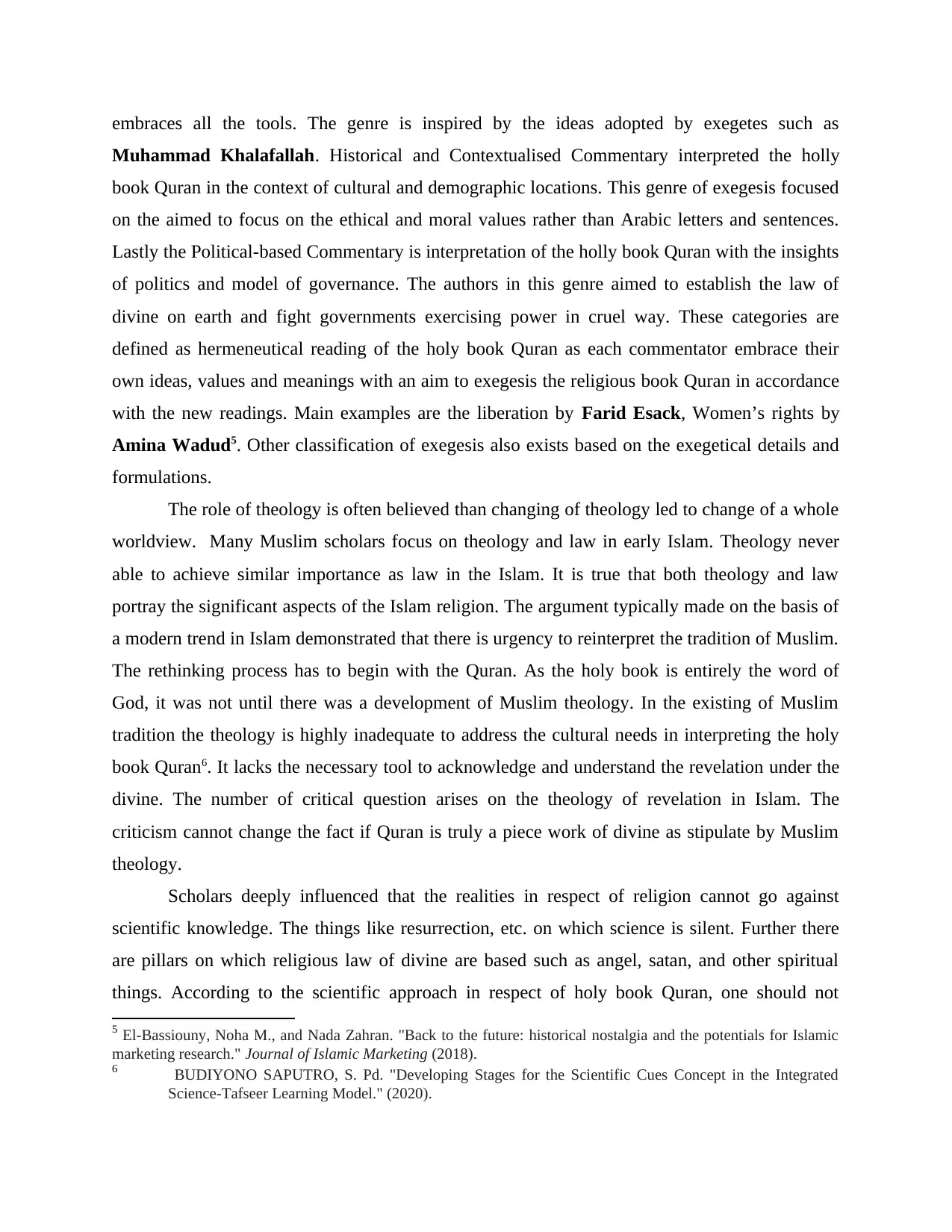
embraces all the tools. The genre is inspired by the ideas adopted by exegetes such as
Muhammad Khalafallah. Historical and Contextualised Commentary interpreted the holly
book Quran in the context of cultural and demographic locations. This genre of exegesis focused
on the aimed to focus on the ethical and moral values rather than Arabic letters and sentences.
Lastly the Political-based Commentary is interpretation of the holly book Quran with the insights
of politics and model of governance. The authors in this genre aimed to establish the law of
divine on earth and fight governments exercising power in cruel way. These categories are
defined as hermeneutical reading of the holy book Quran as each commentator embrace their
own ideas, values and meanings with an aim to exegesis the religious book Quran in accordance
with the new readings. Main examples are the liberation by Farid Esack, Women’s rights by
Amina Wadud5. Other classification of exegesis also exists based on the exegetical details and
formulations.
The role of theology is often believed than changing of theology led to change of a whole
worldview. Many Muslim scholars focus on theology and law in early Islam. Theology never
able to achieve similar importance as law in the Islam. It is true that both theology and law
portray the significant aspects of the Islam religion. The argument typically made on the basis of
a modern trend in Islam demonstrated that there is urgency to reinterpret the tradition of Muslim.
The rethinking process has to begin with the Quran. As the holy book is entirely the word of
God, it was not until there was a development of Muslim theology. In the existing of Muslim
tradition the theology is highly inadequate to address the cultural needs in interpreting the holy
book Quran6. It lacks the necessary tool to acknowledge and understand the revelation under the
divine. The number of critical question arises on the theology of revelation in Islam. The
criticism cannot change the fact if Quran is truly a piece work of divine as stipulate by Muslim
theology.
Scholars deeply influenced that the realities in respect of religion cannot go against
scientific knowledge. The things like resurrection, etc. on which science is silent. Further there
are pillars on which religious law of divine are based such as angel, satan, and other spiritual
things. According to the scientific approach in respect of holy book Quran, one should not
5 El-Bassiouny, Noha M., and Nada Zahran. "Back to the future: historical nostalgia and the potentials for Islamic
marketing research." Journal of Islamic Marketing (2018).
6 BUDIYONO SAPUTRO, S. Pd. "Developing Stages for the Scientific Cues Concept in the Integrated
Science-Tafseer Learning Model." (2020).
Muhammad Khalafallah. Historical and Contextualised Commentary interpreted the holly
book Quran in the context of cultural and demographic locations. This genre of exegesis focused
on the aimed to focus on the ethical and moral values rather than Arabic letters and sentences.
Lastly the Political-based Commentary is interpretation of the holly book Quran with the insights
of politics and model of governance. The authors in this genre aimed to establish the law of
divine on earth and fight governments exercising power in cruel way. These categories are
defined as hermeneutical reading of the holy book Quran as each commentator embrace their
own ideas, values and meanings with an aim to exegesis the religious book Quran in accordance
with the new readings. Main examples are the liberation by Farid Esack, Women’s rights by
Amina Wadud5. Other classification of exegesis also exists based on the exegetical details and
formulations.
The role of theology is often believed than changing of theology led to change of a whole
worldview. Many Muslim scholars focus on theology and law in early Islam. Theology never
able to achieve similar importance as law in the Islam. It is true that both theology and law
portray the significant aspects of the Islam religion. The argument typically made on the basis of
a modern trend in Islam demonstrated that there is urgency to reinterpret the tradition of Muslim.
The rethinking process has to begin with the Quran. As the holy book is entirely the word of
God, it was not until there was a development of Muslim theology. In the existing of Muslim
tradition the theology is highly inadequate to address the cultural needs in interpreting the holy
book Quran6. It lacks the necessary tool to acknowledge and understand the revelation under the
divine. The number of critical question arises on the theology of revelation in Islam. The
criticism cannot change the fact if Quran is truly a piece work of divine as stipulate by Muslim
theology.
Scholars deeply influenced that the realities in respect of religion cannot go against
scientific knowledge. The things like resurrection, etc. on which science is silent. Further there
are pillars on which religious law of divine are based such as angel, satan, and other spiritual
things. According to the scientific approach in respect of holy book Quran, one should not
5 El-Bassiouny, Noha M., and Nada Zahran. "Back to the future: historical nostalgia and the potentials for Islamic
marketing research." Journal of Islamic Marketing (2018).
6 BUDIYONO SAPUTRO, S. Pd. "Developing Stages for the Scientific Cues Concept in the Integrated
Science-Tafseer Learning Model." (2020).
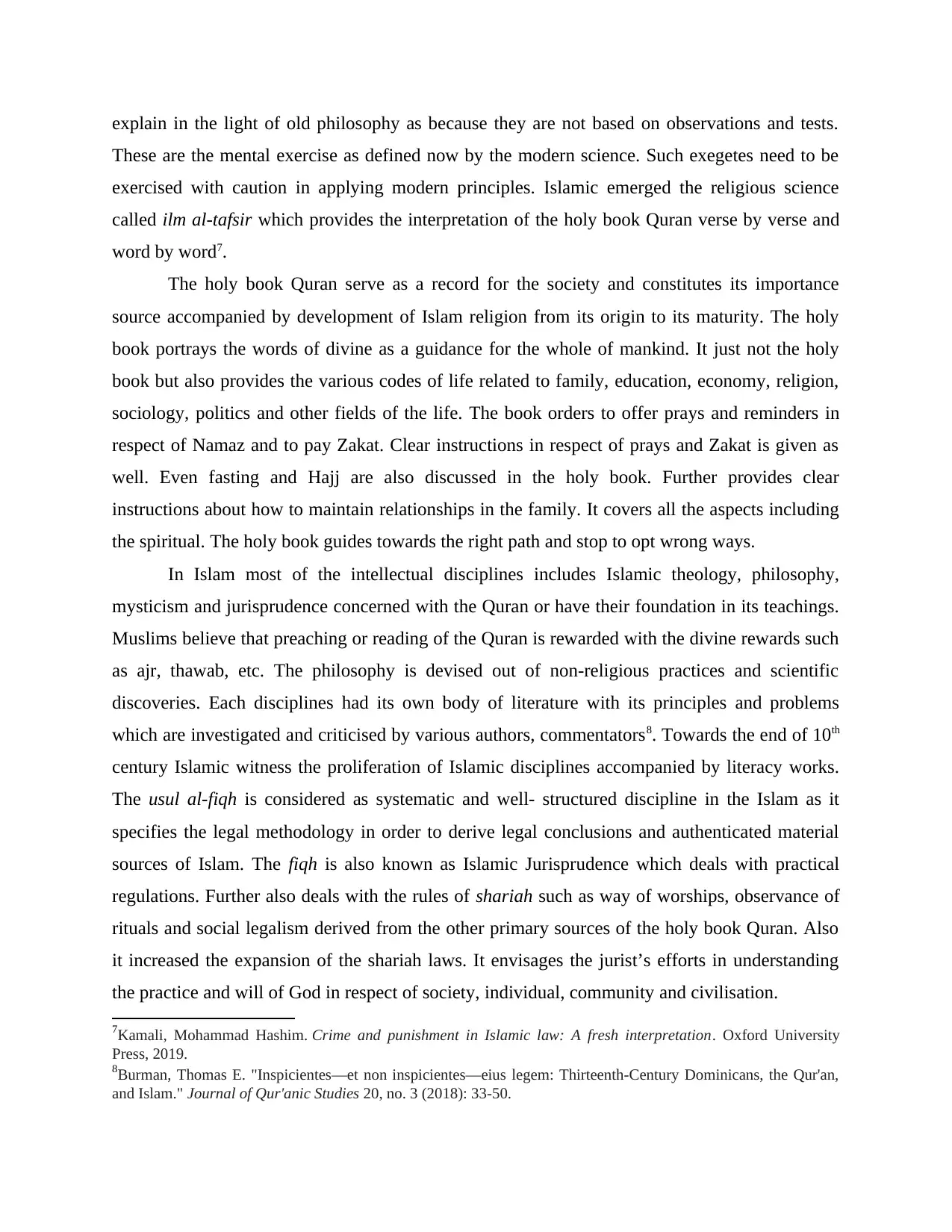
explain in the light of old philosophy as because they are not based on observations and tests.
These are the mental exercise as defined now by the modern science. Such exegetes need to be
exercised with caution in applying modern principles. Islamic emerged the religious science
called ilm al-tafsir which provides the interpretation of the holy book Quran verse by verse and
word by word7.
The holy book Quran serve as a record for the society and constitutes its importance
source accompanied by development of Islam religion from its origin to its maturity. The holy
book portrays the words of divine as a guidance for the whole of mankind. It just not the holy
book but also provides the various codes of life related to family, education, economy, religion,
sociology, politics and other fields of the life. The book orders to offer prays and reminders in
respect of Namaz and to pay Zakat. Clear instructions in respect of prays and Zakat is given as
well. Even fasting and Hajj are also discussed in the holy book. Further provides clear
instructions about how to maintain relationships in the family. It covers all the aspects including
the spiritual. The holy book guides towards the right path and stop to opt wrong ways.
In Islam most of the intellectual disciplines includes Islamic theology, philosophy,
mysticism and jurisprudence concerned with the Quran or have their foundation in its teachings.
Muslims believe that preaching or reading of the Quran is rewarded with the divine rewards such
as ajr, thawab, etc. The philosophy is devised out of non-religious practices and scientific
discoveries. Each disciplines had its own body of literature with its principles and problems
which are investigated and criticised by various authors, commentators8. Towards the end of 10th
century Islamic witness the proliferation of Islamic disciplines accompanied by literacy works.
The usul al-fiqh is considered as systematic and well- structured discipline in the Islam as it
specifies the legal methodology in order to derive legal conclusions and authenticated material
sources of Islam. The fiqh is also known as Islamic Jurisprudence which deals with practical
regulations. Further also deals with the rules of shariah such as way of worships, observance of
rituals and social legalism derived from the other primary sources of the holy book Quran. Also
it increased the expansion of the shariah laws. It envisages the jurist’s efforts in understanding
the practice and will of God in respect of society, individual, community and civilisation.
7Kamali, Mohammad Hashim. Crime and punishment in Islamic law: A fresh interpretation. Oxford University
Press, 2019.
8Burman, Thomas E. "Inspicientes—et non inspicientes—eius legem: Thirteenth-Century Dominicans, the Qur'an,
and Islam." Journal of Qur'anic Studies 20, no. 3 (2018): 33-50.
These are the mental exercise as defined now by the modern science. Such exegetes need to be
exercised with caution in applying modern principles. Islamic emerged the religious science
called ilm al-tafsir which provides the interpretation of the holy book Quran verse by verse and
word by word7.
The holy book Quran serve as a record for the society and constitutes its importance
source accompanied by development of Islam religion from its origin to its maturity. The holy
book portrays the words of divine as a guidance for the whole of mankind. It just not the holy
book but also provides the various codes of life related to family, education, economy, religion,
sociology, politics and other fields of the life. The book orders to offer prays and reminders in
respect of Namaz and to pay Zakat. Clear instructions in respect of prays and Zakat is given as
well. Even fasting and Hajj are also discussed in the holy book. Further provides clear
instructions about how to maintain relationships in the family. It covers all the aspects including
the spiritual. The holy book guides towards the right path and stop to opt wrong ways.
In Islam most of the intellectual disciplines includes Islamic theology, philosophy,
mysticism and jurisprudence concerned with the Quran or have their foundation in its teachings.
Muslims believe that preaching or reading of the Quran is rewarded with the divine rewards such
as ajr, thawab, etc. The philosophy is devised out of non-religious practices and scientific
discoveries. Each disciplines had its own body of literature with its principles and problems
which are investigated and criticised by various authors, commentators8. Towards the end of 10th
century Islamic witness the proliferation of Islamic disciplines accompanied by literacy works.
The usul al-fiqh is considered as systematic and well- structured discipline in the Islam as it
specifies the legal methodology in order to derive legal conclusions and authenticated material
sources of Islam. The fiqh is also known as Islamic Jurisprudence which deals with practical
regulations. Further also deals with the rules of shariah such as way of worships, observance of
rituals and social legalism derived from the other primary sources of the holy book Quran. Also
it increased the expansion of the shariah laws. It envisages the jurist’s efforts in understanding
the practice and will of God in respect of society, individual, community and civilisation.
7Kamali, Mohammad Hashim. Crime and punishment in Islamic law: A fresh interpretation. Oxford University
Press, 2019.
8Burman, Thomas E. "Inspicientes—et non inspicientes—eius legem: Thirteenth-Century Dominicans, the Qur'an,
and Islam." Journal of Qur'anic Studies 20, no. 3 (2018): 33-50.
⊘ This is a preview!⊘
Do you want full access?
Subscribe today to unlock all pages.

Trusted by 1+ million students worldwide
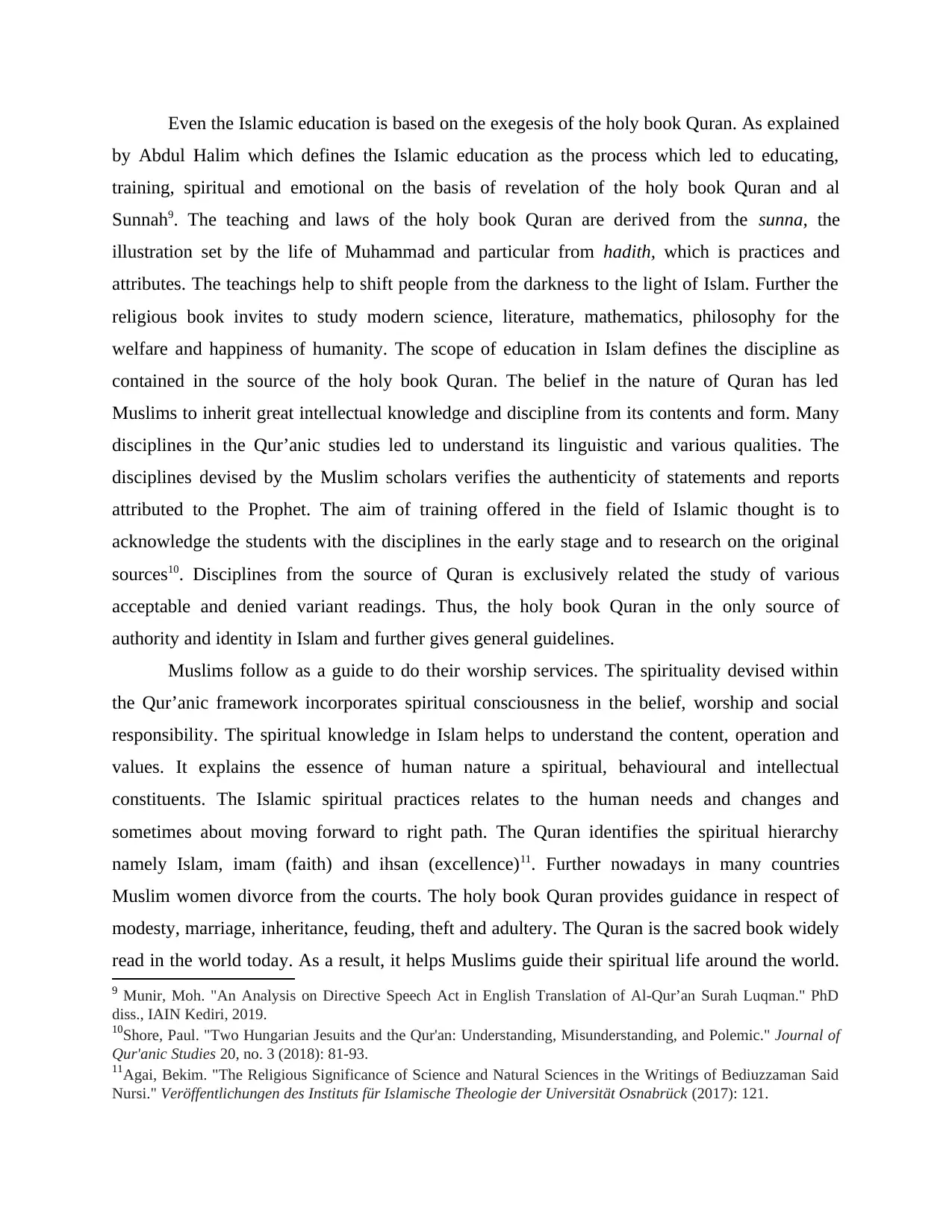
Even the Islamic education is based on the exegesis of the holy book Quran. As explained
by Abdul Halim which defines the Islamic education as the process which led to educating,
training, spiritual and emotional on the basis of revelation of the holy book Quran and al
Sunnah9. The teaching and laws of the holy book Quran are derived from the sunna, the
illustration set by the life of Muhammad and particular from hadith, which is practices and
attributes. The teachings help to shift people from the darkness to the light of Islam. Further the
religious book invites to study modern science, literature, mathematics, philosophy for the
welfare and happiness of humanity. The scope of education in Islam defines the discipline as
contained in the source of the holy book Quran. The belief in the nature of Quran has led
Muslims to inherit great intellectual knowledge and discipline from its contents and form. Many
disciplines in the Qur’anic studies led to understand its linguistic and various qualities. The
disciplines devised by the Muslim scholars verifies the authenticity of statements and reports
attributed to the Prophet. The aim of training offered in the field of Islamic thought is to
acknowledge the students with the disciplines in the early stage and to research on the original
sources10. Disciplines from the source of Quran is exclusively related the study of various
acceptable and denied variant readings. Thus, the holy book Quran in the only source of
authority and identity in Islam and further gives general guidelines.
Muslims follow as a guide to do their worship services. The spirituality devised within
the Qur’anic framework incorporates spiritual consciousness in the belief, worship and social
responsibility. The spiritual knowledge in Islam helps to understand the content, operation and
values. It explains the essence of human nature a spiritual, behavioural and intellectual
constituents. The Islamic spiritual practices relates to the human needs and changes and
sometimes about moving forward to right path. The Quran identifies the spiritual hierarchy
namely Islam, imam (faith) and ihsan (excellence)11. Further nowadays in many countries
Muslim women divorce from the courts. The holy book Quran provides guidance in respect of
modesty, marriage, inheritance, feuding, theft and adultery. The Quran is the sacred book widely
read in the world today. As a result, it helps Muslims guide their spiritual life around the world.
9 Munir, Moh. "An Analysis on Directive Speech Act in English Translation of Al-Qur’an Surah Luqman." PhD
diss., IAIN Kediri, 2019.
10Shore, Paul. "Two Hungarian Jesuits and the Qur'an: Understanding, Misunderstanding, and Polemic." Journal of
Qur'anic Studies 20, no. 3 (2018): 81-93.
11Agai, Bekim. "The Religious Significance of Science and Natural Sciences in the Writings of Bediuzzaman Said
Nursi." Veröffentlichungen des Instituts für Islamische Theologie der Universität Osnabrück (2017): 121.
by Abdul Halim which defines the Islamic education as the process which led to educating,
training, spiritual and emotional on the basis of revelation of the holy book Quran and al
Sunnah9. The teaching and laws of the holy book Quran are derived from the sunna, the
illustration set by the life of Muhammad and particular from hadith, which is practices and
attributes. The teachings help to shift people from the darkness to the light of Islam. Further the
religious book invites to study modern science, literature, mathematics, philosophy for the
welfare and happiness of humanity. The scope of education in Islam defines the discipline as
contained in the source of the holy book Quran. The belief in the nature of Quran has led
Muslims to inherit great intellectual knowledge and discipline from its contents and form. Many
disciplines in the Qur’anic studies led to understand its linguistic and various qualities. The
disciplines devised by the Muslim scholars verifies the authenticity of statements and reports
attributed to the Prophet. The aim of training offered in the field of Islamic thought is to
acknowledge the students with the disciplines in the early stage and to research on the original
sources10. Disciplines from the source of Quran is exclusively related the study of various
acceptable and denied variant readings. Thus, the holy book Quran in the only source of
authority and identity in Islam and further gives general guidelines.
Muslims follow as a guide to do their worship services. The spirituality devised within
the Qur’anic framework incorporates spiritual consciousness in the belief, worship and social
responsibility. The spiritual knowledge in Islam helps to understand the content, operation and
values. It explains the essence of human nature a spiritual, behavioural and intellectual
constituents. The Islamic spiritual practices relates to the human needs and changes and
sometimes about moving forward to right path. The Quran identifies the spiritual hierarchy
namely Islam, imam (faith) and ihsan (excellence)11. Further nowadays in many countries
Muslim women divorce from the courts. The holy book Quran provides guidance in respect of
modesty, marriage, inheritance, feuding, theft and adultery. The Quran is the sacred book widely
read in the world today. As a result, it helps Muslims guide their spiritual life around the world.
9 Munir, Moh. "An Analysis on Directive Speech Act in English Translation of Al-Qur’an Surah Luqman." PhD
diss., IAIN Kediri, 2019.
10Shore, Paul. "Two Hungarian Jesuits and the Qur'an: Understanding, Misunderstanding, and Polemic." Journal of
Qur'anic Studies 20, no. 3 (2018): 81-93.
11Agai, Bekim. "The Religious Significance of Science and Natural Sciences in the Writings of Bediuzzaman Said
Nursi." Veröffentlichungen des Instituts für Islamische Theologie der Universität Osnabrück (2017): 121.
Paraphrase This Document
Need a fresh take? Get an instant paraphrase of this document with our AI Paraphraser
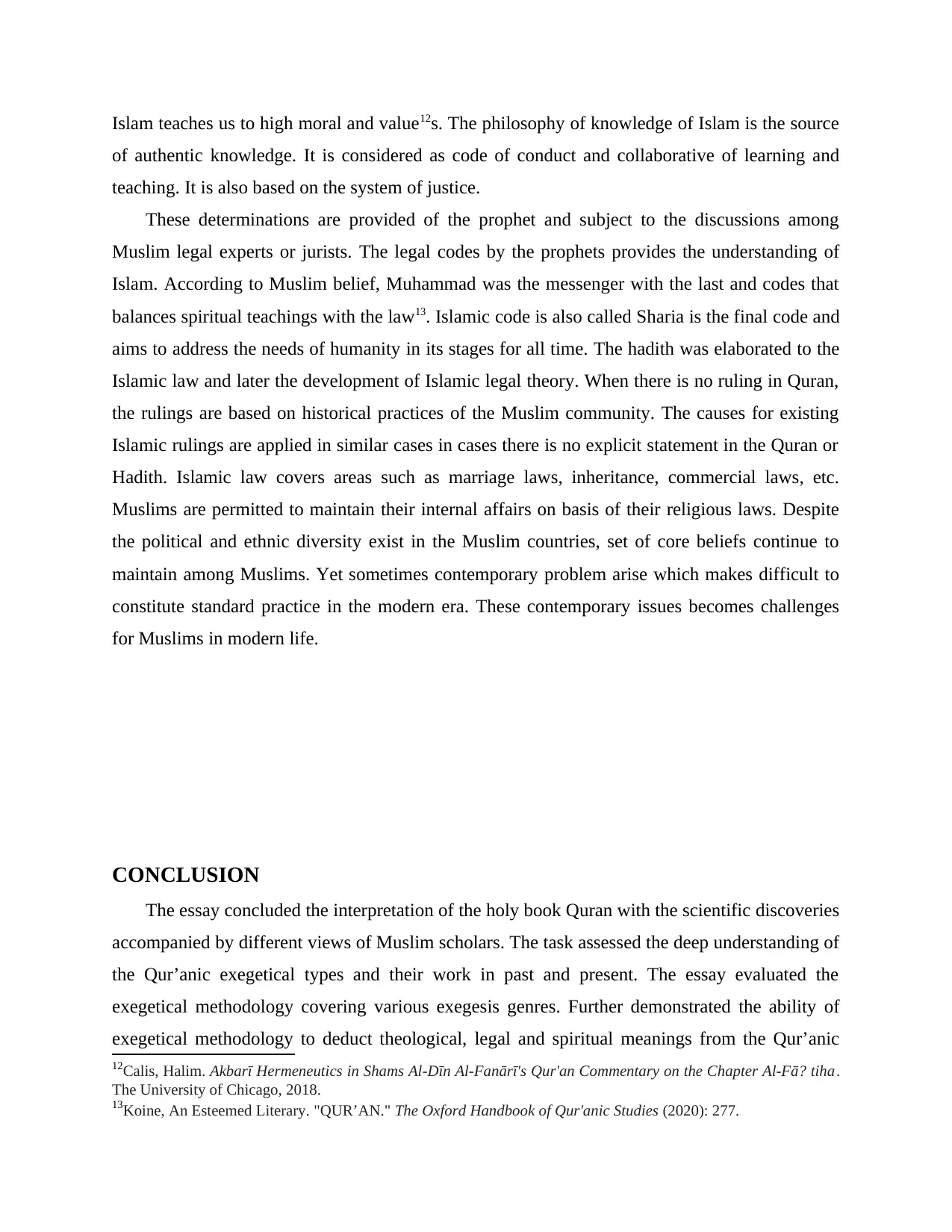
Islam teaches us to high moral and value12s. The philosophy of knowledge of Islam is the source
of authentic knowledge. It is considered as code of conduct and collaborative of learning and
teaching. It is also based on the system of justice.
These determinations are provided of the prophet and subject to the discussions among
Muslim legal experts or jurists. The legal codes by the prophets provides the understanding of
Islam. According to Muslim belief, Muhammad was the messenger with the last and codes that
balances spiritual teachings with the law13. Islamic code is also called Sharia is the final code and
aims to address the needs of humanity in its stages for all time. The hadith was elaborated to the
Islamic law and later the development of Islamic legal theory. When there is no ruling in Quran,
the rulings are based on historical practices of the Muslim community. The causes for existing
Islamic rulings are applied in similar cases in cases there is no explicit statement in the Quran or
Hadith. Islamic law covers areas such as marriage laws, inheritance, commercial laws, etc.
Muslims are permitted to maintain their internal affairs on basis of their religious laws. Despite
the political and ethnic diversity exist in the Muslim countries, set of core beliefs continue to
maintain among Muslims. Yet sometimes contemporary problem arise which makes difficult to
constitute standard practice in the modern era. These contemporary issues becomes challenges
for Muslims in modern life.
CONCLUSION
The essay concluded the interpretation of the holy book Quran with the scientific discoveries
accompanied by different views of Muslim scholars. The task assessed the deep understanding of
the Qur’anic exegetical types and their work in past and present. The essay evaluated the
exegetical methodology covering various exegesis genres. Further demonstrated the ability of
exegetical methodology to deduct theological, legal and spiritual meanings from the Qur’anic
12Calis, Halim. Akbarī Hermeneutics in Shams Al-Dīn Al-Fanārī's Qur'an Commentary on the Chapter Al-Fā? tiha.
The University of Chicago, 2018.
13Koine, An Esteemed Literary. "QUR’AN." The Oxford Handbook of Qur'anic Studies (2020): 277.
of authentic knowledge. It is considered as code of conduct and collaborative of learning and
teaching. It is also based on the system of justice.
These determinations are provided of the prophet and subject to the discussions among
Muslim legal experts or jurists. The legal codes by the prophets provides the understanding of
Islam. According to Muslim belief, Muhammad was the messenger with the last and codes that
balances spiritual teachings with the law13. Islamic code is also called Sharia is the final code and
aims to address the needs of humanity in its stages for all time. The hadith was elaborated to the
Islamic law and later the development of Islamic legal theory. When there is no ruling in Quran,
the rulings are based on historical practices of the Muslim community. The causes for existing
Islamic rulings are applied in similar cases in cases there is no explicit statement in the Quran or
Hadith. Islamic law covers areas such as marriage laws, inheritance, commercial laws, etc.
Muslims are permitted to maintain their internal affairs on basis of their religious laws. Despite
the political and ethnic diversity exist in the Muslim countries, set of core beliefs continue to
maintain among Muslims. Yet sometimes contemporary problem arise which makes difficult to
constitute standard practice in the modern era. These contemporary issues becomes challenges
for Muslims in modern life.
CONCLUSION
The essay concluded the interpretation of the holy book Quran with the scientific discoveries
accompanied by different views of Muslim scholars. The task assessed the deep understanding of
the Qur’anic exegetical types and their work in past and present. The essay evaluated the
exegetical methodology covering various exegesis genres. Further demonstrated the ability of
exegetical methodology to deduct theological, legal and spiritual meanings from the Qur’anic
12Calis, Halim. Akbarī Hermeneutics in Shams Al-Dīn Al-Fanārī's Qur'an Commentary on the Chapter Al-Fā? tiha.
The University of Chicago, 2018.
13Koine, An Esteemed Literary. "QUR’AN." The Oxford Handbook of Qur'anic Studies (2020): 277.
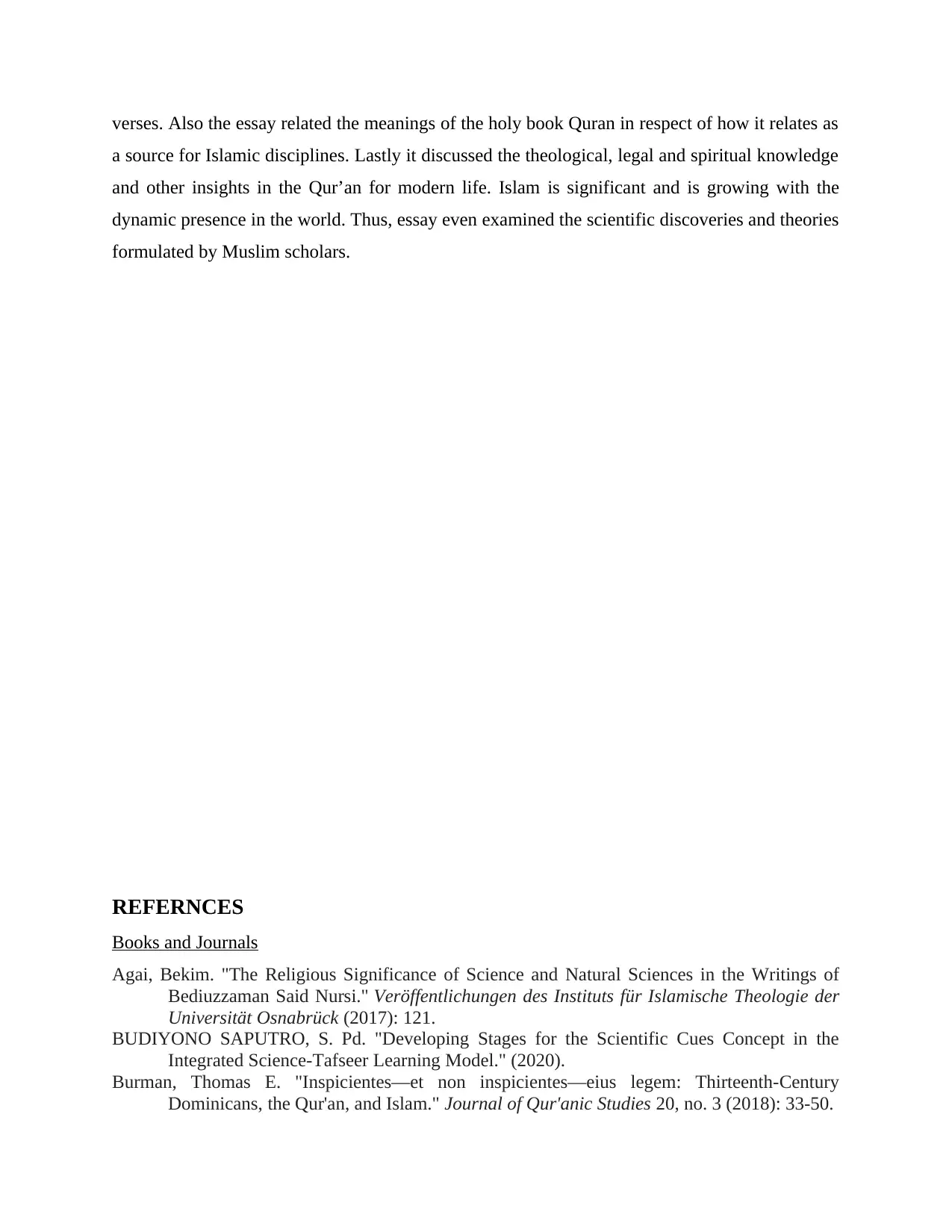
verses. Also the essay related the meanings of the holy book Quran in respect of how it relates as
a source for Islamic disciplines. Lastly it discussed the theological, legal and spiritual knowledge
and other insights in the Qur’an for modern life. Islam is significant and is growing with the
dynamic presence in the world. Thus, essay even examined the scientific discoveries and theories
formulated by Muslim scholars.
REFERNCES
Books and Journals
Agai, Bekim. "The Religious Significance of Science and Natural Sciences in the Writings of
Bediuzzaman Said Nursi." Veröffentlichungen des Instituts für Islamische Theologie der
Universität Osnabrück (2017): 121.
BUDIYONO SAPUTRO, S. Pd. "Developing Stages for the Scientific Cues Concept in the
Integrated Science-Tafseer Learning Model." (2020).
Burman, Thomas E. "Inspicientes—et non inspicientes—eius legem: Thirteenth-Century
Dominicans, the Qur'an, and Islam." Journal of Qur'anic Studies 20, no. 3 (2018): 33-50.
a source for Islamic disciplines. Lastly it discussed the theological, legal and spiritual knowledge
and other insights in the Qur’an for modern life. Islam is significant and is growing with the
dynamic presence in the world. Thus, essay even examined the scientific discoveries and theories
formulated by Muslim scholars.
REFERNCES
Books and Journals
Agai, Bekim. "The Religious Significance of Science and Natural Sciences in the Writings of
Bediuzzaman Said Nursi." Veröffentlichungen des Instituts für Islamische Theologie der
Universität Osnabrück (2017): 121.
BUDIYONO SAPUTRO, S. Pd. "Developing Stages for the Scientific Cues Concept in the
Integrated Science-Tafseer Learning Model." (2020).
Burman, Thomas E. "Inspicientes—et non inspicientes—eius legem: Thirteenth-Century
Dominicans, the Qur'an, and Islam." Journal of Qur'anic Studies 20, no. 3 (2018): 33-50.
⊘ This is a preview!⊘
Do you want full access?
Subscribe today to unlock all pages.

Trusted by 1+ million students worldwide
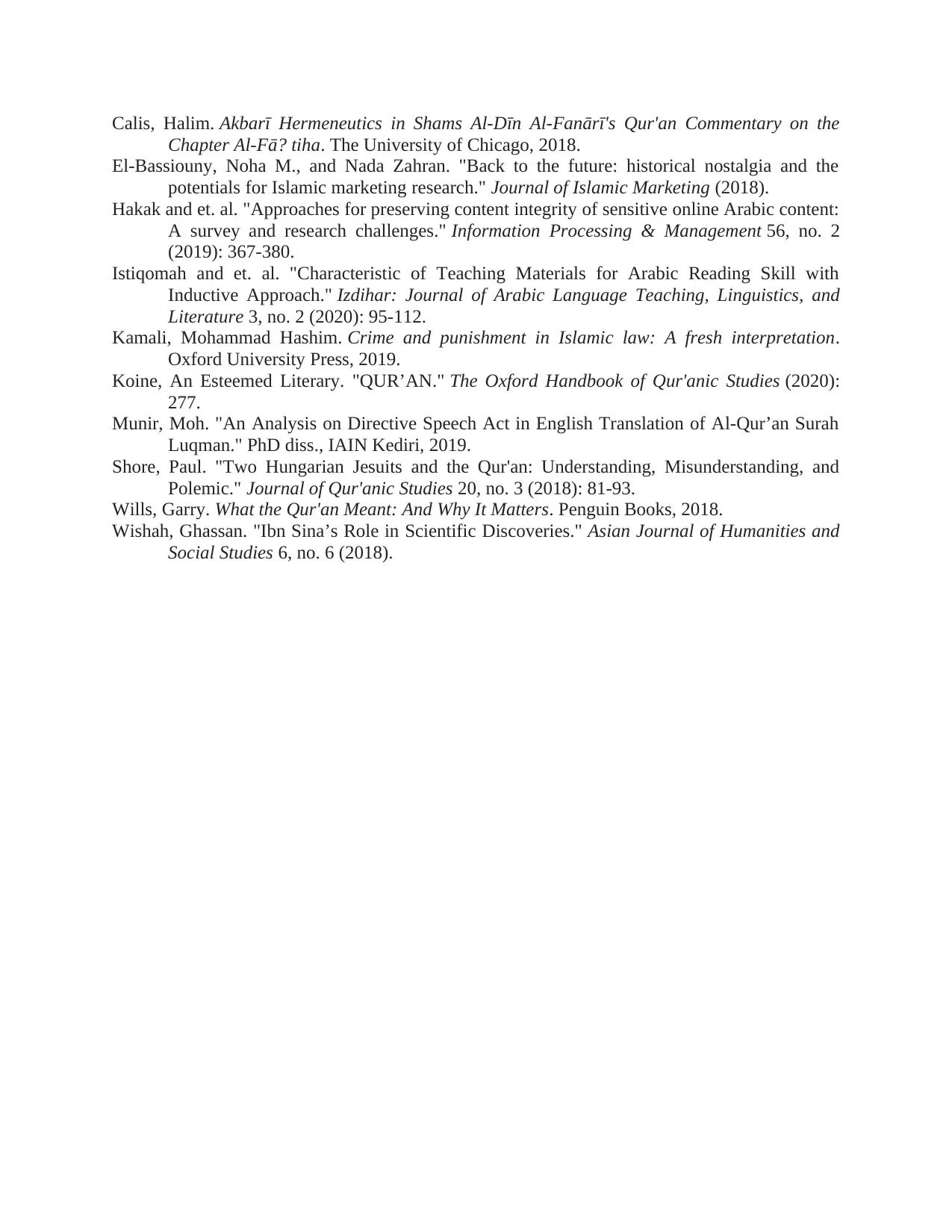
Calis, Halim. Akbarī Hermeneutics in Shams Al-Dīn Al-Fanārī's Qur'an Commentary on the
Chapter Al-Fā? tiha. The University of Chicago, 2018.
El-Bassiouny, Noha M., and Nada Zahran. "Back to the future: historical nostalgia and the
potentials for Islamic marketing research." Journal of Islamic Marketing (2018).
Hakak and et. al. "Approaches for preserving content integrity of sensitive online Arabic content:
A survey and research challenges." Information Processing & Management 56, no. 2
(2019): 367-380.
Istiqomah and et. al. "Characteristic of Teaching Materials for Arabic Reading Skill with
Inductive Approach." Izdihar: Journal of Arabic Language Teaching, Linguistics, and
Literature 3, no. 2 (2020): 95-112.
Kamali, Mohammad Hashim. Crime and punishment in Islamic law: A fresh interpretation.
Oxford University Press, 2019.
Koine, An Esteemed Literary. "QUR’AN." The Oxford Handbook of Qur'anic Studies (2020):
277.
Munir, Moh. "An Analysis on Directive Speech Act in English Translation of Al-Qur’an Surah
Luqman." PhD diss., IAIN Kediri, 2019.
Shore, Paul. "Two Hungarian Jesuits and the Qur'an: Understanding, Misunderstanding, and
Polemic." Journal of Qur'anic Studies 20, no. 3 (2018): 81-93.
Wills, Garry. What the Qur'an Meant: And Why It Matters. Penguin Books, 2018.
Wishah, Ghassan. "Ibn Sina’s Role in Scientific Discoveries." Asian Journal of Humanities and
Social Studies 6, no. 6 (2018).
Chapter Al-Fā? tiha. The University of Chicago, 2018.
El-Bassiouny, Noha M., and Nada Zahran. "Back to the future: historical nostalgia and the
potentials for Islamic marketing research." Journal of Islamic Marketing (2018).
Hakak and et. al. "Approaches for preserving content integrity of sensitive online Arabic content:
A survey and research challenges." Information Processing & Management 56, no. 2
(2019): 367-380.
Istiqomah and et. al. "Characteristic of Teaching Materials for Arabic Reading Skill with
Inductive Approach." Izdihar: Journal of Arabic Language Teaching, Linguistics, and
Literature 3, no. 2 (2020): 95-112.
Kamali, Mohammad Hashim. Crime and punishment in Islamic law: A fresh interpretation.
Oxford University Press, 2019.
Koine, An Esteemed Literary. "QUR’AN." The Oxford Handbook of Qur'anic Studies (2020):
277.
Munir, Moh. "An Analysis on Directive Speech Act in English Translation of Al-Qur’an Surah
Luqman." PhD diss., IAIN Kediri, 2019.
Shore, Paul. "Two Hungarian Jesuits and the Qur'an: Understanding, Misunderstanding, and
Polemic." Journal of Qur'anic Studies 20, no. 3 (2018): 81-93.
Wills, Garry. What the Qur'an Meant: And Why It Matters. Penguin Books, 2018.
Wishah, Ghassan. "Ibn Sina’s Role in Scientific Discoveries." Asian Journal of Humanities and
Social Studies 6, no. 6 (2018).
1 out of 10
Related Documents
Your All-in-One AI-Powered Toolkit for Academic Success.
+13062052269
info@desklib.com
Available 24*7 on WhatsApp / Email
![[object Object]](/_next/static/media/star-bottom.7253800d.svg)
Unlock your academic potential
Copyright © 2020–2026 A2Z Services. All Rights Reserved. Developed and managed by ZUCOL.
